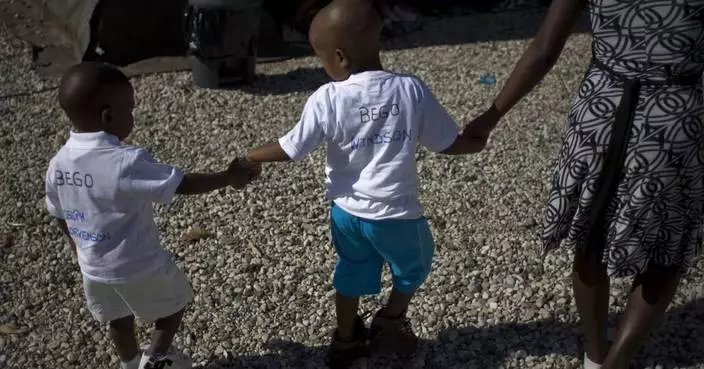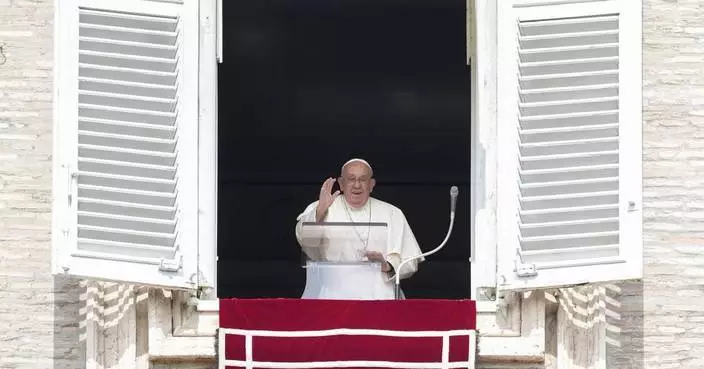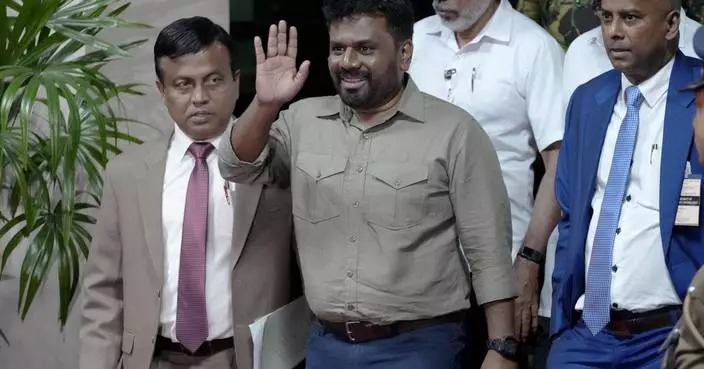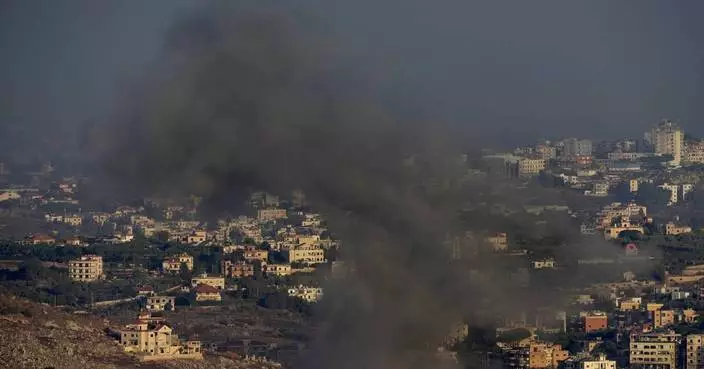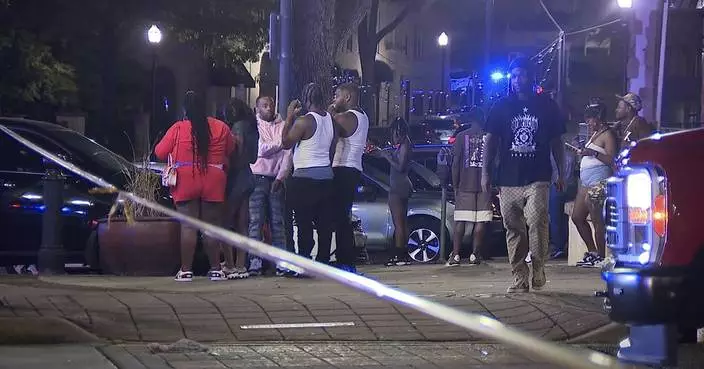PARIS (AP) — France’s new government dominated by conservatives and centrists gathered for the first time Monday as Prime Minister Michel Barnier set budget and migrant issues as top priorities.
Barnier convened a meeting on Monday morning with newly appointed ministers ahead of a Cabinet session in the afternoon with centrist President Emmanuel Macron at the Elysee presidential palace.
The long-awaited list of government members was unveiled Saturday, more than two months after elections that produced a hung parliament and deepened political divisions as France grapples with growing financial and diplomatic challenges.
Speaking on Sunday evening in his first televised interview since his appointment, Barnier acknowledged a key challenge for his government will be the 2025 budget bill to be debated at parliament starting from next month.
Barnier called on France 2 television for a “national effort required to redress the situation" after France was placed earlier this year by the European Union's executive arm under a formal procedure for running up excessive debt.
“I’m not going to further increase the tax burden on all French people,” Barnier promised, yet suggesting that “the wealthiest contribute to this national effort.”
In June, the EU Commission recommended to seven nations, including France, that they start a so-called “excessive deficit procedure,” the first step in a long process before any member state can be hemmed in and moved to take corrective action.
Barnier also vowed to “control and limit immigration" in Sunday's interview. He said numbers of migrants coming to France “has become unbearable.”
He referred to measures taken by neighboring countries like Germany, which this month ordered temporary controls at all land borders.
Barnier was appointed at the beginning of the month. His first major political test will come on Oct. 1, when he is set to deliver his general policy speech to the National Assembly, France’s powerful lower house of parliament.
A left-wing coalition, the New Popular Front, secured the most seats in June-July parliamentary elections but failed to win a majority.
The New Popular Front was not given a chance to form a minority government, and refused to make concessions and join a more left-leaning government alliance.
Barnier argued that the deal made by his conservative allies and Macron's centrists will allow them to have a bigger support at the National Assembly.
Barnier, a 73-year-old political veteran known for his role as the EU’s Brexit negotiator, is no stranger to complex political tasks.
“We’ll make compromises,” he said. “That’s how I managed to unite the EU 27 countries during the Brexit negotiations."
Barnier also insisted there will be “no controversy” between him and Macron despite both coming from a different political background, because "that’s the interest of the country.”
Macron is to head Tuesday to New York for the U.N. General Assembly, before a two-day visit to Canada.
In France, the president holds a dominant role on strategic matters of defense and foreign policy while the prime minister leads the government and usually focus more on domestic issues.
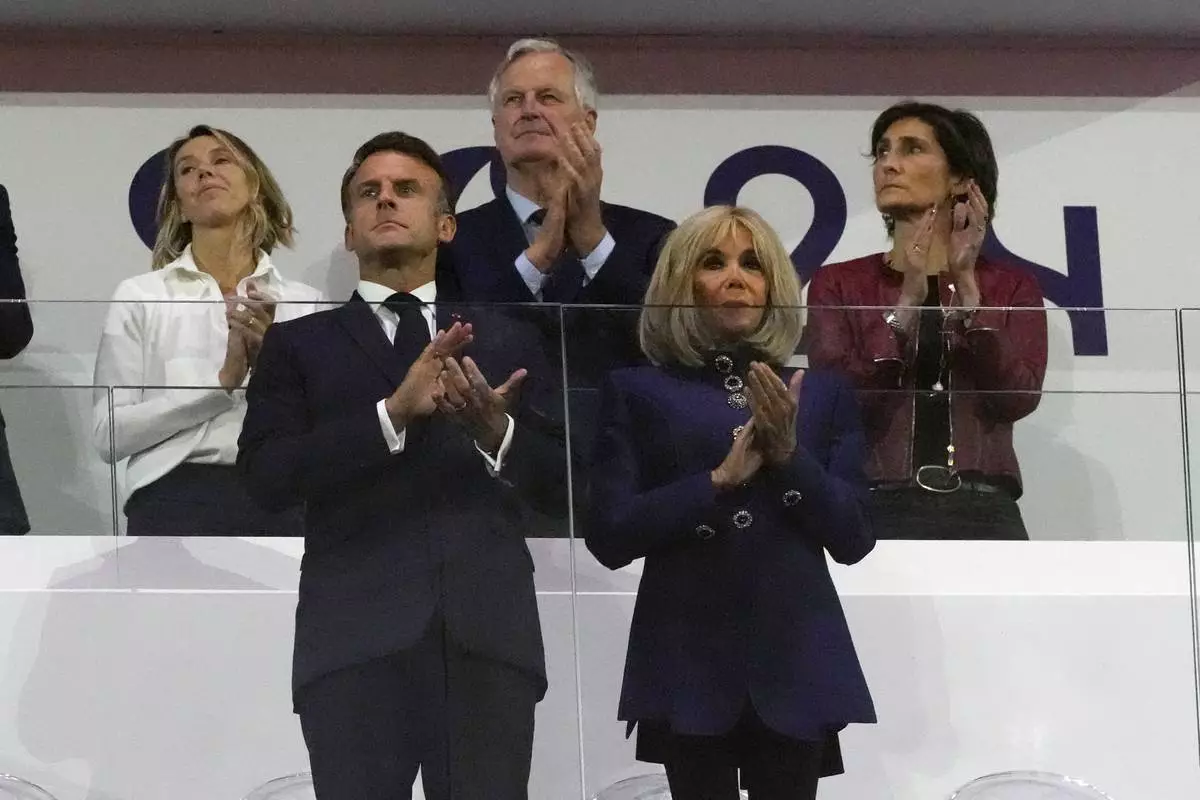
FILE - French Prime Minister Michel Barnier, background center, French President Emmanuel Macron, foreground left, and Macron's wife, Brigitte Macron, foreground right, applaud during the closing ceremony of the 2024 Paralympics, Sunday, Sept. 8, 2024, in Paris, France. (AP Photo/Michel Euler, File)
JERUSALEM (AP) — Lebanon’s Health Ministry says a wave of Israeli airstrikes across the country on Monday have killed 50 people and wounded more than 300.
The ministry said that the preliminary toll included women and children.
The airstrikes hit wide areas in southern and northeastern Lebanon.
The Israeli military said it struck 300 targets in Lebanon as it steps up pressure against the Hezbollah militant group.
The army announced the strikes on the social media platform X, posting a photo of what is said was the military chief, Lt. Gen. Herzi Halevi, approving additional attacks from military headquarters in Tel Aviv.
It is one of the most intense barrages of airstrikes in nearly one year of fighting against Hezbollah. Halevi and other Israeli leaders have promised tougher action against Hezbollah in the coming days.
As Israel was carrying out the attacks, Israeli authorities reported a series of air-raid sirens in northern Israel warning of incoming rocket fire from Lebanon.
Israel earlier Monday urged residents of southern Lebanon to leave their homes in areas where it claims Hezbollah has stored weapons, warning of “extensive strikes” there.
THIS IS A BREAKING NEWS UPDATE. AP’s earlier story follows below.
JERUSALEM (AP) — Israel on Monday urged residents of southern Lebanon to evacuate from homes and other buildings where it claimed Hezbollah has stored weapons, saying the military would conduct “extensive strikes” against the militant group.
It was the first warning of its kind in nearly a year of steadily escalating conflict and came after a particularly heavy exchange of fire on Sunday. Hezbollah launched around 150 rockets, missiles and drones into northern Israel in retaliation for strikes that killed a top commander and dozens of fighters.
There was no sign of an immediate exodus from the villages of southern Lebanon, and the warning left open the possibility that some residents could live in or near targeted structures without knowing that they are risk.
The increasing strikes and counterstrikes have raised fears of an all-out war, even as Israel is still battling Hamas in Gaza and trying to return scores of hostages taken in Hamas' Oct. 7 attack. Hezbollah has vowed to continue its strikes in solidarity with the Palestinians and Hamas, a fellow Iran-backed militant group. Israel says it is committed to returning calm to its northern border.
Associated Press journalists in southern Lebanon reported heavy airstrikes targeting many areas Monday morning, including some far from the border.
Lebanon's state-run National News Agency said the strikes hit a forested area in the central province of Byblos, about 130 kilometers (81 miles) north of the Israeli-Lebanese border, for the first time since the exchanges began in October. No injuries were reported there. Israel also bombed targets in the northeastern Baalbek and Hermel regions, where a shepherd was killed and two family members were wounded, according to the news agency. It said a total of 30 people were wounded in strikes.
The Lebanese Health Ministry asked hospitals in southern Lebanon and the eastern Bekaa valley to postpone surgeries that could be done later. The ministry said in a statement that its request aimed to keep hospitals ready to deal with people wounded by “Israel’s expanding aggression on Lebanon.”
An Israeli military official said Israel is focused on aerial operations and has no immediate plans for a ground operation. The official, speaking on condition of anonymity in keeping with regulations, said the strikes are aimed at curbing Hezbollah's ability to launch more strikes into Israel.
Lebanese media reported that residents received text messages urging them to move away from any building where Hezbollah stores arms until further notice.
“If you are in a building housing weapons for Hezbollah, move away from the village until further notice,” the Arabic message reads, according to Lebanese media.
Lebanon's information minister, Ziad Makary, said in a statement that his office in Beirut had received a recorded message telling people to leave the building.
“This comes in the framework of the psychological war implemented by the enemy,” Makary said, and urged people “not to give the matter more attention than it deserves.”
It was not immediately clear how many people would be affected by the Israeli orders. Communities on both sides of the border have largely emptied out because of the near-daily exchanges of fire.
Israel has accused Hezbollah of transforming entire communities in the south into militant bases, with hidden rocket launchers and other infrastructure. That could lead the Israeli military to wage an especially heavy bombing campaign, even if no ground forces move in.
The military said it had targeted more than 150 militant sites early Monday. Residents of different villages in southern Lebanon posted photos on social media of airstrikes and large plumes of smoke. The state-run National News Agency also reported airstrikes on different areas.
An Israeli airstrike on a Beirut suburb on Friday killed a top Hezbollah military commander and more than a dozen fighters, as well as dozens of civilians, including women and children.
Last week, thousands of communications devices, used mainly by Hezbollah members, exploded in different parts of Lebanon, killing 39 people and wounding nearly 3,000. Lebanon blamed Israel for the attacks, but Israel did not confirm or deny any responsibility.
Hezbollah began firing into Israel a day after the Oct. 7 attack in what it said was an attempt to pin down Israeli forces to help Palestinian fighters in Gaza. Israel has retaliated with airstrikes, and the conflict has steadily intensified over the past year.
The fighting has killed hundreds of people in Lebanon, dozens in Israel and displaced tens of thousands on both sides of the border. It has also sparked brush fires that have destroyed agriculture and scarred the landscape.
Israel has vowed to push Hezbollah back from the border so its citizens can return to their homes, saying it prefers to do so diplomatically but is willing to use force. Hezbollah has said it will keep up its attacks until there is a cease-fire in Gaza, but that appears increasingly elusive as the war nears its anniversary.
Hamas-led militants stormed into southern Israel on Oct. 7, killing some 1,200 people, mostly civilians, and abducting around 250. Some 100 captives are still held in Gaza, a third of whom are believed to be dead, after most of the rest were released during a weeklong cease-fire in November.
Israel's offensive has killed over 41,000 Palestinians, according to Gaza's Health Ministry, which does not differentiate between civilians and fighters in its count. It says women and children make up a little over half of those killed. Israel says it has killed over 17,000 militants, without providing evidence.
Mroue reported from Beirut. Associated Press writer Abby Sewell in Beirut contributed to this report.
Follow AP’s war coverage at https://apnews.com/hub/israel-hamas-war
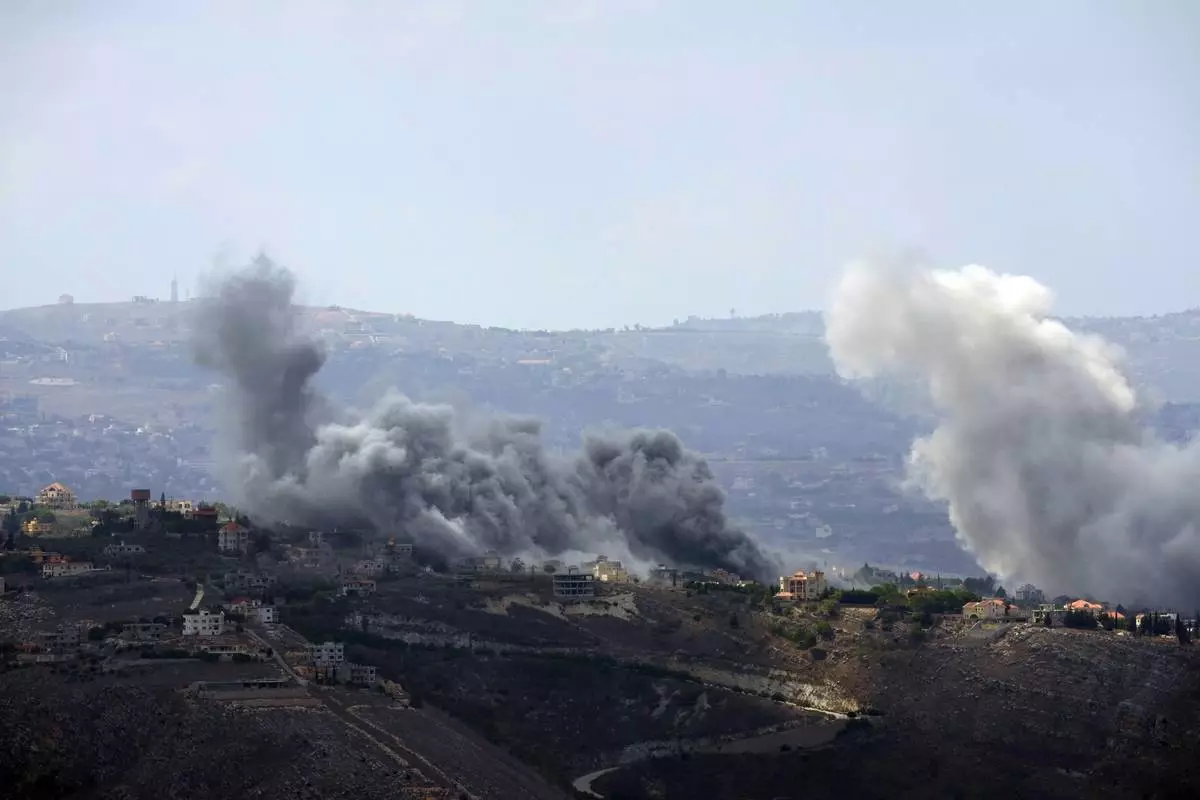
Smoke rises from Israeli airstrikes on Taybeh village, seen from the southern town of Marjayoun, Lebanon, Monday, Sept. 23, 2024. (AP Photo/Hussein Malla)
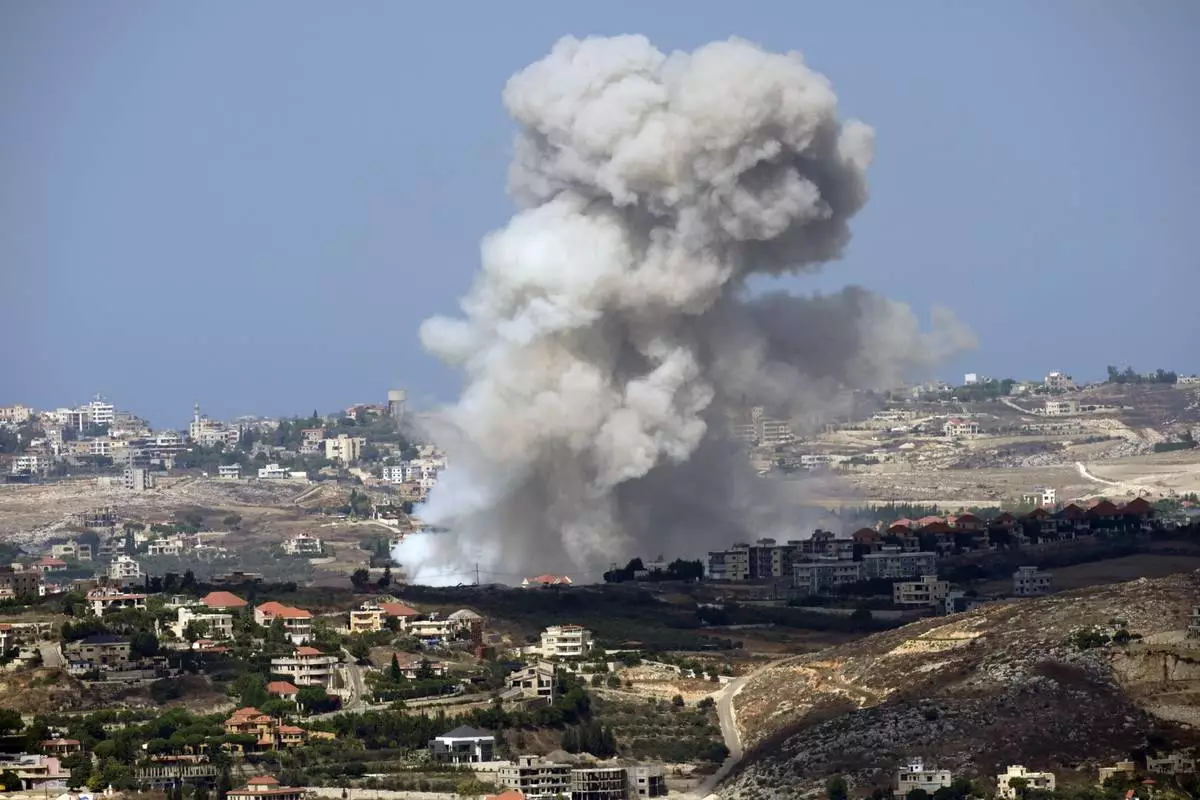
Smoke rises from Israeli shelling on villages in the Nabatiyeh district, seen from the southern town of Marjayoun, Lebanon, Monday, Sept. 23, 2024. (AP Photo/Hussein Malla)
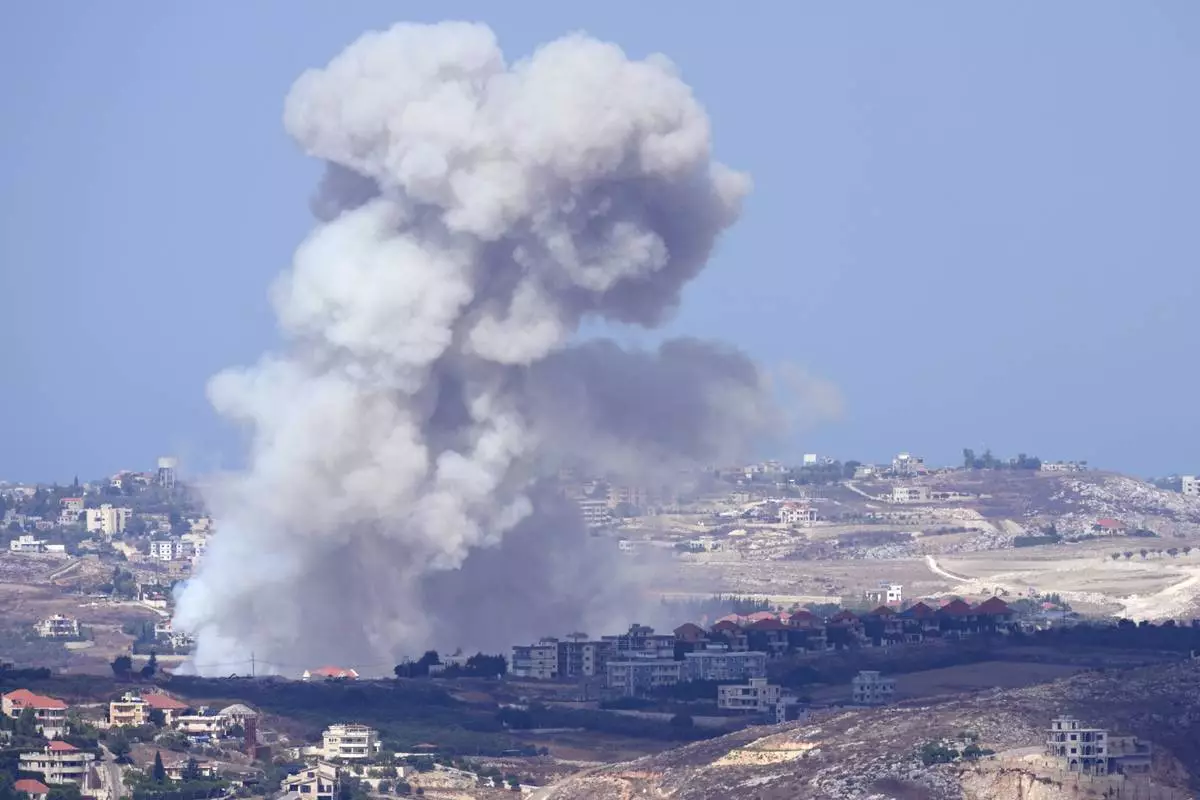
Smoke rises from Israeli airstrikes on villages in the Nabatiyeh district, seen from the southern town of Marjayoun, Lebanon, Monday, Sept. 23, 2024.(AP Photo/Hussein Malla)
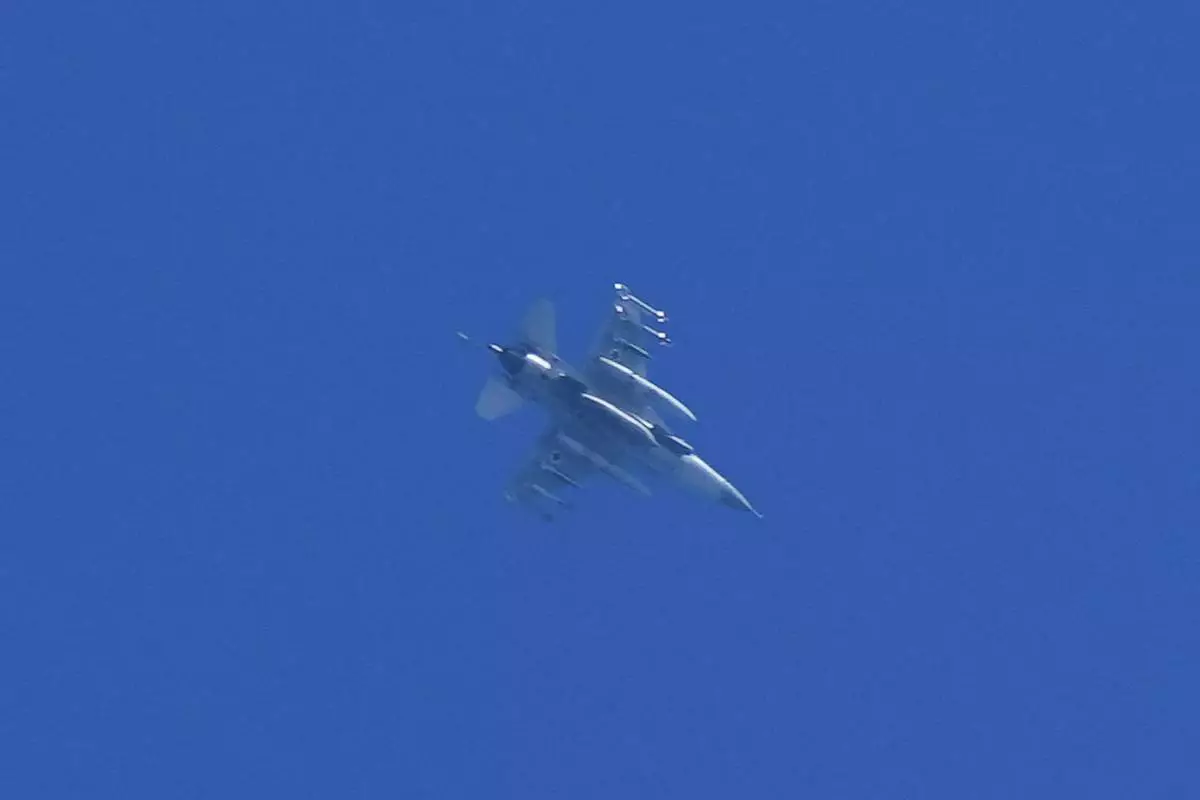
An armed Israeli fighter jet is seen from Haifa, northern Israel, on Monday, Sept. 23, 2024. (AP Photo/Baz Ratner)
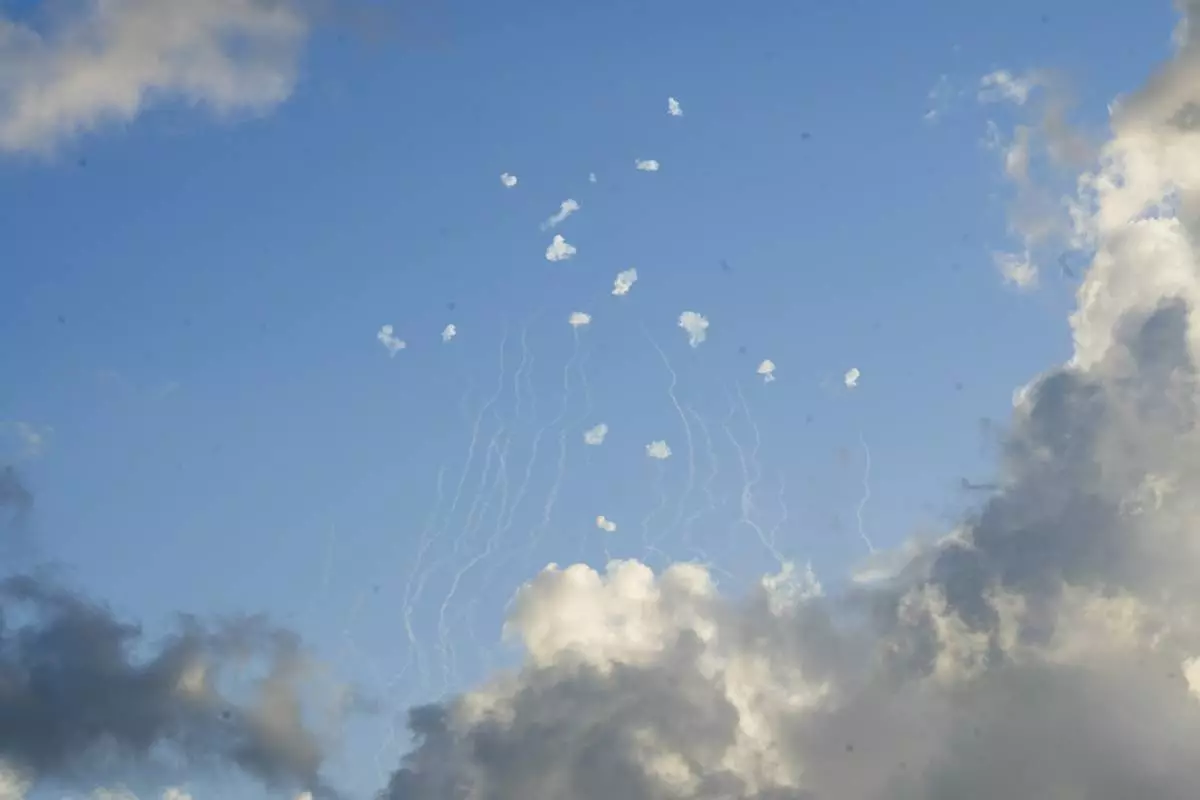
Israeli Iron Dome air defense system fires to intercept rockets that were launched from Lebanon, in northern Israel, Sunday, Sept. 22, 2024. (AP Photo/Baz Ratner)
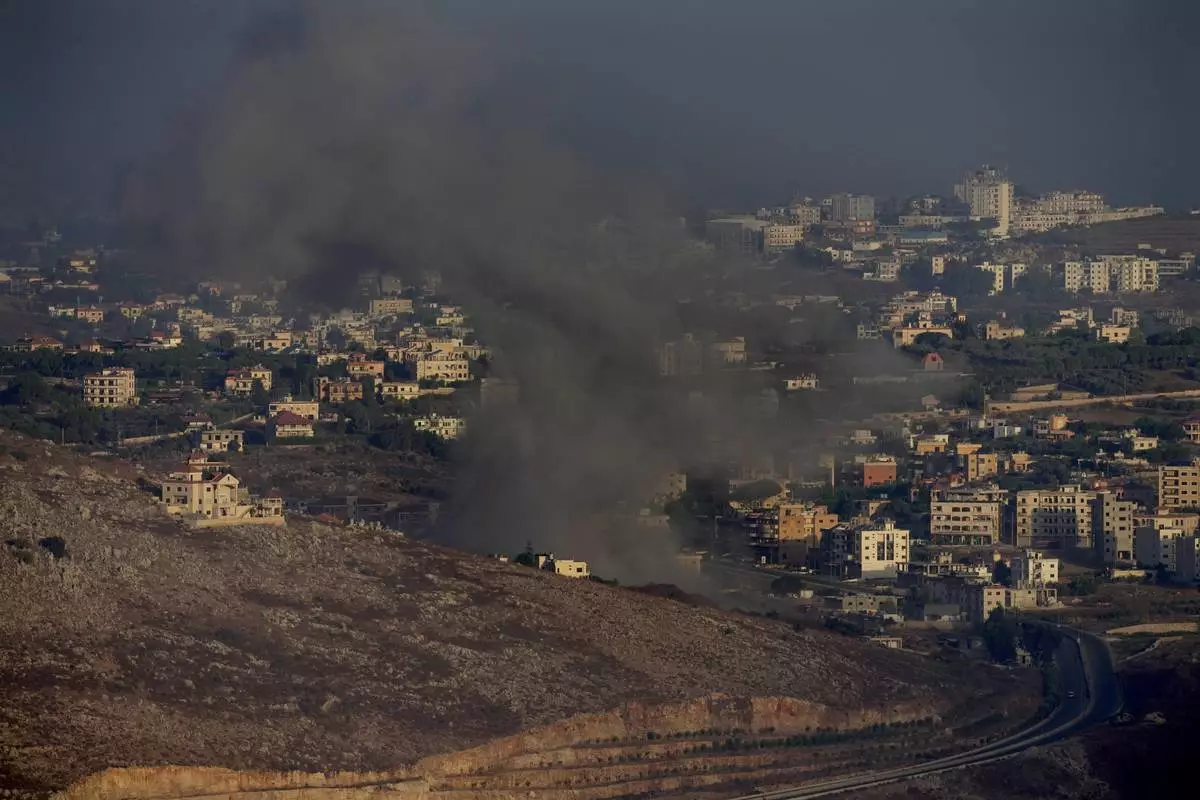
Smoke rises from an Israeli airstrike on Kfar Rouman village, as seen from Marjayoun town, south Lebanon, Monday, Sept. 23, 2024. (AP Photo/Hussein Malla)
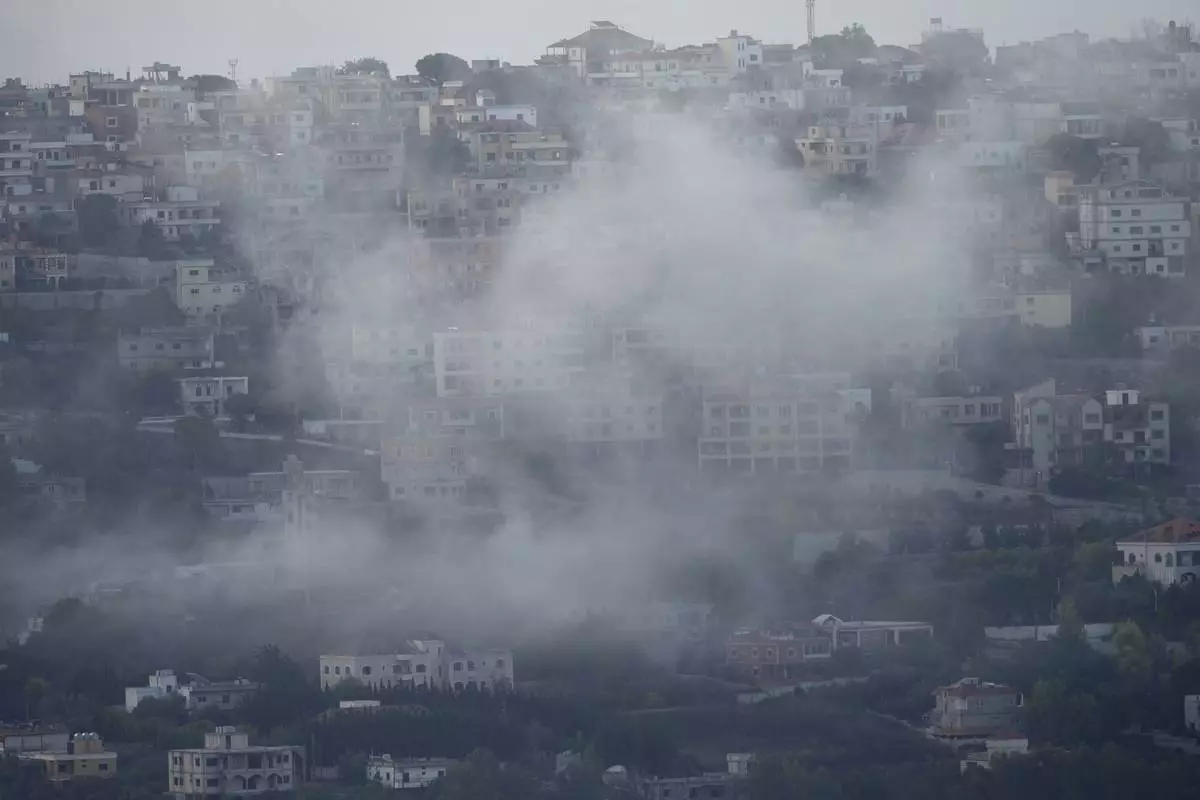
Smoke rises from an Israeli airstrike on Khiam village, as seen from Marjayoun town, south Lebanon, Monday, Sept. 23, 2024. (AP Photo/Hussein Malla)
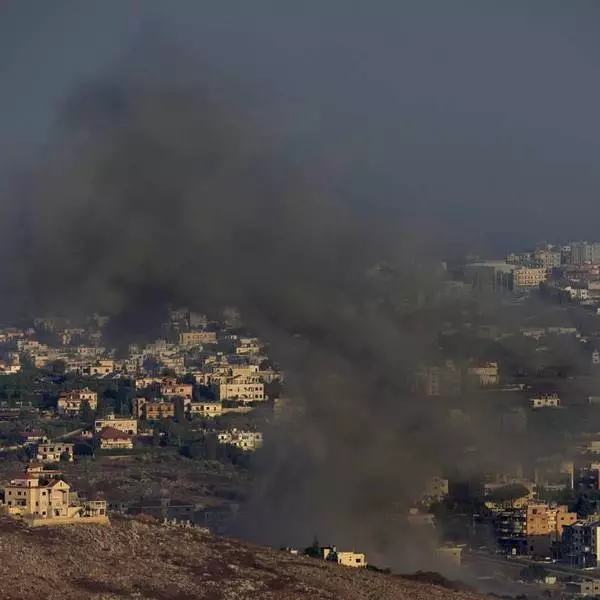
Israel calls on Lebanese to leave homes where Hezbollah stores arms as warplanes launch new strikes
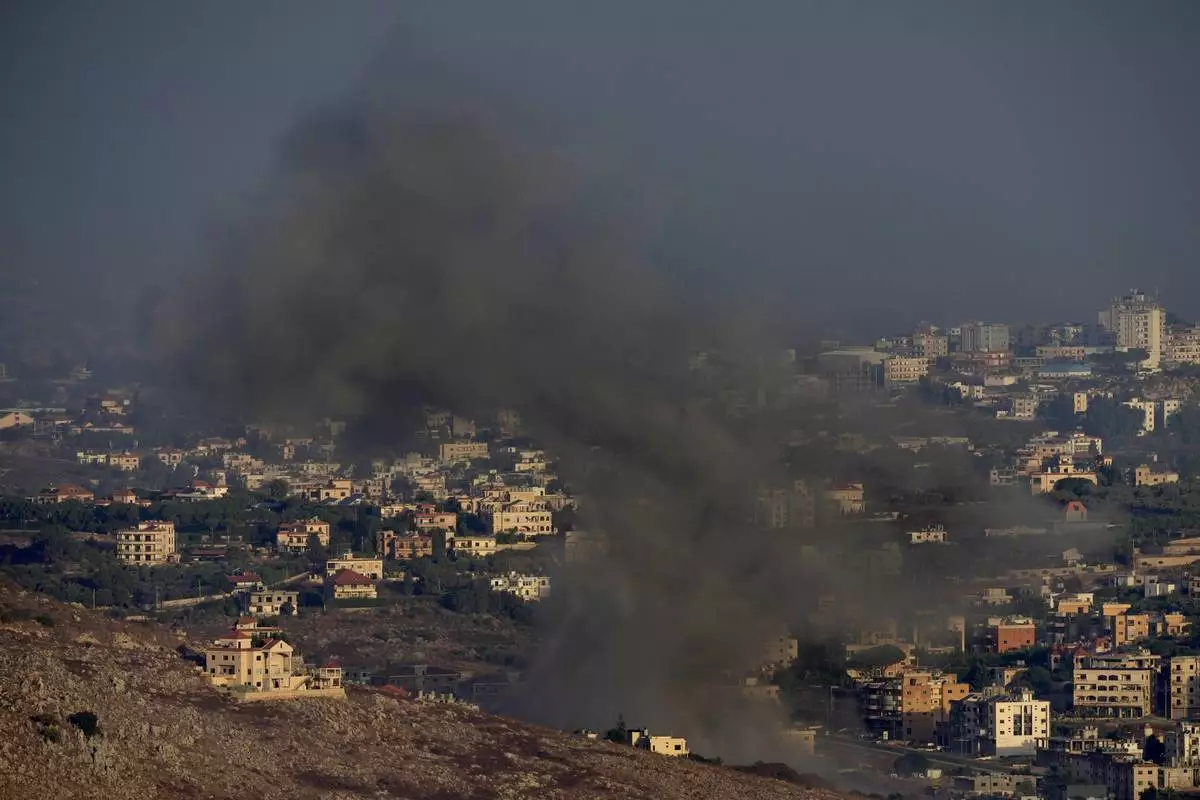
Smoke rises from an Israeli airstrike on Kfar Rouman village, as seen from Marjayoun town, south Lebanon, Monday, Sept. 23, 2024. (AP Photo/Hussein Malla)
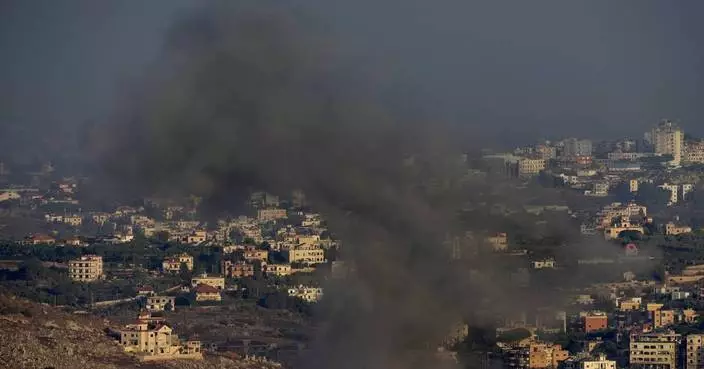
Israel calls on Lebanese to leave homes where Hezbollah stores arms as warplanes launch new strikes














